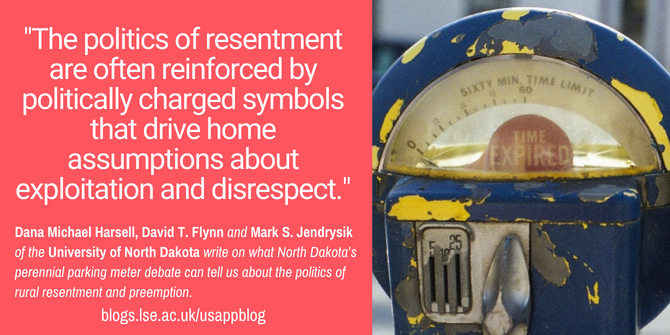

 What can parking meters tell us about state politics in the US? Dana Michael Harsell, David T. Flynn and Mark S. Jendrysik examine debates over North Dakota’s 70-year ban on parking meters, writing that the blocking of efforts to repeal the measure are an illustration of the resentment that results from the state’s long-standing urban-rural divide and ideals about local control. Opponents to the repeal, they write, have taken advantage of “small-government” ideals while also using “big government” preemptive measures to reaffirm state control.
What can parking meters tell us about state politics in the US? Dana Michael Harsell, David T. Flynn and Mark S. Jendrysik examine debates over North Dakota’s 70-year ban on parking meters, writing that the blocking of efforts to repeal the measure are an illustration of the resentment that results from the state’s long-standing urban-rural divide and ideals about local control. Opponents to the repeal, they write, have taken advantage of “small-government” ideals while also using “big government” preemptive measures to reaffirm state control.
Uniquely in the United States, North Dakota statue bans the use of parking meters on public streets and causeways. The nearly 70-year ban was the result of an initiated measure, spearheaded by then state-senator Howard Henry in 1948 after he received a dozen parking tickets (and a court summons) during his regular business commute to Minot, the state’s fourth-largest city. While the ban remains unpopular among leaders of the state’s more populated cities, historical efforts to repeal the ban have been hindered by the state’s long-standing urban-rural divide and the political culture it engenders. The ban’s longevity also shows features of state politics more generally, including rural political culture, the politics of rural resentment, and increased state preemption of local decision-making authority.
Rural Culture and the Politics of Rural Resentment
Place-based identities are a long-standing feature of how rural Americans make sense of political issues. A prevalent and growing division among rural and urban centers stems from a perception that urban interests regularly and unfairly deprive their rural counterparts of equitable resources. This sense drives policy preferences and voting patterns in a phenomenon that Katherine Cramer refers to as the politics of resentment.
Within states, the politics of resentment can emerge as political conflict in the vertical relationship between the state and its local governmental units. This increasingly takes the form of the “new preemption,” where state legislatures enact “sweeping state laws that clearly, intentionally, extensively, and at times punitively bar local efforts to address a host of local problems.”
Parking Meters as a North Dakota Political and Cultural Marker
North Dakota’s contemporary political culture embodies an urban-rural divide that predates its 1889 statehood. Moreover, its expansive local infrastructure (there are 2,664 substate governments for about 775,000 people) reinforces long-held egalitarian values for equal distribution of public benefits and costs, participatory government, and local control.
The politics of resentment are often reinforced by politically charged symbols that drive home assumptions about exploitation and disrespect. In North Dakota, the use of parking meters in urban areas represents a powerful cultural marker and a potent focus for rural resentment. The fault lines of the parking meter ban stem from a cultural perception that parking meters impose an unfair “tax” on rural residents who conduct business in the state’s more populous areas. This frame is perceived by many rural residents as an unequal distribution of public costs and benefits—and thus a violation of the state’s long-standing egalitarian norms.
The 2017 Repeal Effort
The 2017-19 legislative session witnessed the most credible effort in decades to repeal the ban and legalize parking meters in the state. The repeal effort initially passed the Senate (33-10) and a modified version (permitting meters only if first approved by the political subdivision’s voters) passed the House (53-38). The early versions of the bill conformed well to the state’s ingrained ideals of local control and enjoyed strong support in both chambers. However, the repeal language was subsequently modified by a joint House and Senate Conference committee, permitting the “governing body of a political subdivision” to decide whether to refer the question for a public vote. The Conference Committee version passed in the Senate (33-13) but failed to pass the House a few days later (29-59).
Much of the early legislative debates linked the repeal effort to the state’s time-honored ideal of local control. The importance of this frame spurred support from a key number of rural senators, and it was palatable for a number of rural House members—provided that voters first approved the use of parking meters within their respective jurisdictions. However, the post-Conference Committee language shifted the House debate in in subtle but consequential ways. First, opponents reframed the commonly understood meaning of “local control,” arguing that political authority rests with the people and not their political subdivisions. Second, some House members argued that unrestrained adoption of parking meters by political subdivisions threatened to institutionalize a form of distributive injustice among surrounding rural areas. The fear that unchecked local (government) control could lead to further exploitation of rural residents elevated statewide egalitarianism values over norms of local government autonomy and turned the repeal effort into a liability for a critical number of House members.

Photo by Josh Newton on Unsplash
Implications for State Politics
The politics of resentment helps to unpack the defeat of the repeal effort in the state House, but the outcome suggests that other dynamics are in play. First, rural and urban identities are not necessarily monolithic and individuals are capable of ascribing to multiple (and sometimes competing) social identity frames. These frames include strong attachments to place and place-based identities influence how residents understand political actions that affect those places. For example, residents of the North Dakota’s more populous cities may identify as “urban” in the context of state-wide policy initiatives but identify as “rural” in the context of national politics. The strength of individual place-based identities relative to the frames activated in the post-Conference House debate (i.e., local control versus the threat of rural imposition) may account for some of the increased opposition among House members who served urban districts. Second, an increased use of preemptive measures by state legislatures reflects a growing resentment between rural and urban areas. Thus, preemption becomes a mechanism to stymie local policy efforts in urban areas in favor of statewide laws that reflect rural values.
Beyond parking meters
The question of whether to allow parking meters in North Dakota has a symbolic value and meaning far beyond any practical effect on the lives of most of its citizens (and in reality, may only affect a few city blocks in the state’s largest city). Yet, the issue has become entwined with larger questions that reflect changes in the state and its history. By equating paying for parking as an imposition to rural residents and reframing the virtues of traditional local control as a potential threat to the will of the people, representatives opposing the repeal nevertheless were able to defend “small-government” ideals while simultaneously using “big government” preemptive measures to reaffirm state control over the issue.
- This article is based on the paper, “Park Free or Die: Rural Consciousness, Preemption, and the Perennial North Dakota Parking Meter Debate” published in PS: Political Science.
- Please read our comments policy before commenting.
- Note: This article gives the views of the author, and not the position of USAPP – American Politics and Policy, nor the London School of Economics.
- Shortened URL for this post: https://bit.ly/3GS01R7






